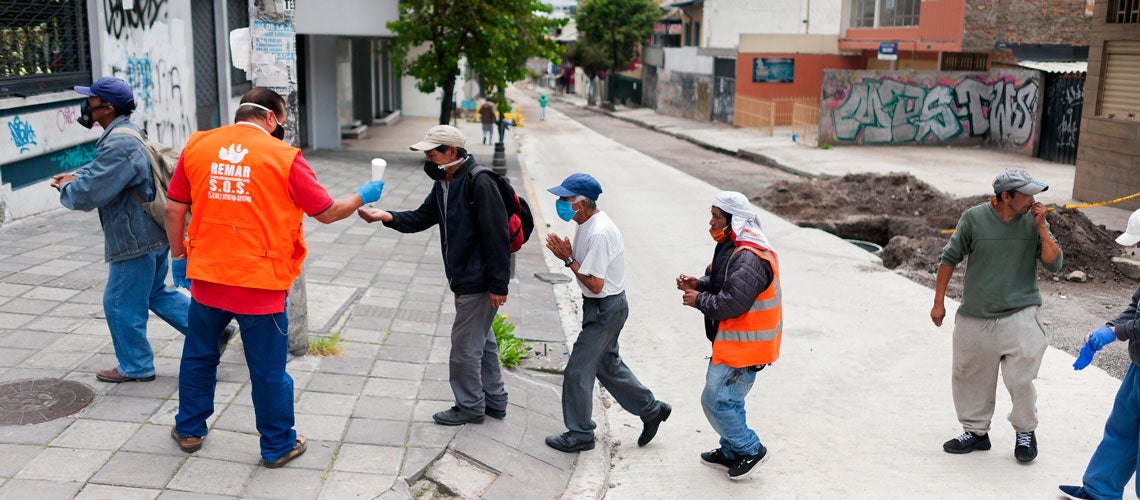 Photo credit: Paul Salazar/Banco Mundial.
Photo credit: Paul Salazar/Banco Mundial.
The coronavirus pandemic has taken a drastic human toll, with close to 15 million confirmed cases of COVID-19 and over 600,000 deaths around the world by mid July.
As the geography of the outbreak continues to shift, new hot spots are emerging in developing countries – including in Latin America and South Asia – as well as worrying trends in parts of Africa. Second-wave outbreaks are also appearing in areas that had seen progress.
The economic and social impacts of the pandemic are reverberating globally: amid great uncertainty, we can all foresee a very different world for a long time to come. Millions more people are likely to fall into extreme poverty as a result of COVID-19, and the existing poor will experience even deeper deprivation. Well over a billion jobs are under threat worldwide, deepening the need for better safety nets for most informal workers or for many vulnerable groups. As developing countries race to halt the health emergency, they must seek ways to contain the economic and social damage as well as work urgently to get their development agendas back on track.
On all these fronts, the World Bank Group is committed to doing all we can to help. We recognize that the massive scale of the COVID-19 pandemic demands a truly exceptional response. Already we are working with over 100 low- and middle-income countries to bolster their health systems and broad-scale pandemic response as well as lay the groundwork for recovery.
"We plan to provide up to $160 billion in financing from April 2020-June 2021, for mitigating the health emergency as well as dealing with the economic and social impact of the crisis."
This effort involves all the Bank Group’s financing arms, with about 2/3 of this financing from the public sector arm – IBRD/IDA – and the rest from the private sector arm, IFC and MIGA.
As I outlined in a recent blog, there are four priorities for the broad, fast action that the World Bank Group has underway: saving lives threatened by the pandemic; protecting the poor and vulnerable; helping save jobs and businesses; and working to build a more resilient recovery. These priorities are outlined in our operational approach to the COVID-19 crisis, entitled Saving Lives, Scaling-up Impact and Getting Back on Track. I encourage everyone to explore this paper in depth, and I’d like to highlight a few key points here.
The COVID-19 pandemic demands World Bank engagement with unprecedented speed, scale and selectivity. The ambition of our crisis response is to help client countries assist at least one billion people impacted by the COVID-19 crisis and to restore momentum on our Twin Goals – ending extreme poverty and boosting shared prosperity.
We’re organizing our crisis response across the three stages of relief, restructuring, and resilient recovery. The first involves emergency response to the health threat posed by COVID-19 and its immediate social, economic, and financial impacts. Then, as countries bring the pandemic under control and start reopening their economies, the restructuring stage focuses on strengthening health systems for future crises; restoring people’s lives and livelihoods through education, jobs, and access to health care; and helping firms and financial institutions regain a solid footing.
"The resilient recovery stage entails helping countries build a more sustainable, inclusive, and resilient future in a world transformed by the pandemic."
This is best captured by the “building back better” concept, which means putting in place the kind of interventions that meet the short-term needs but also maintain a line of sight on longer term development challenges.
In tackling this crisis, international cooperation assumes a new level of importance. The financing demands are truly staggering and only through close cooperation can we meet this challenge. We will need to work closely between the public and private sectors, particularly helping the private sector get back on its feet and in this way, facilitate the preservation and creation of new jobs. Bearing in mind the Bank Group’s comparative advantage, we’ll work with clients and partners—the public and private sectors, and organizations from the multilateral to the community level—to develop innovative approaches that can speed progress in fighting the pandemic and transform crisis into opportunity.
I’m optimistic that, with perseverance and unwavering support, some countries will be able to reach the resilient recovery stage sooner than we can imagine today. And that makes it especially important that we all start thinking about how each developing country can rebuild better. It’s a long road, and we will need a true global coalition to respond at the scale needed to flatten the curve of the pandemic and steepen the curve of recovery. But we will get there.



Join the Conversation